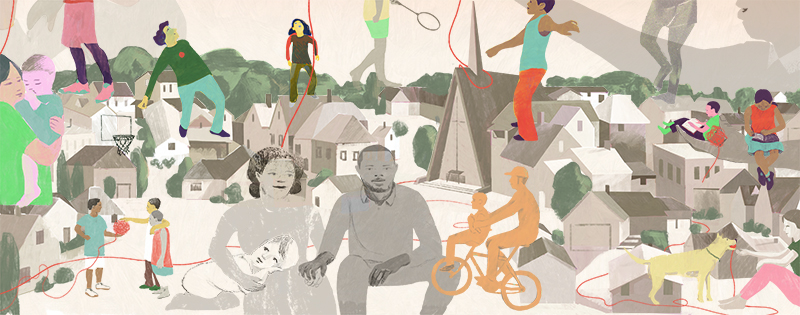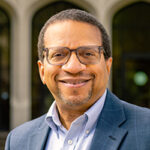
Two colleagues greeted each other during my Southern Africa visit. “How is our wife?” was the first salutation. A brief recount of health followed. The second person then asked, “And how are our children?” The first person answered with summaries about their activities in church, school, and sports. It was a wonderful exchange between old friends who had not seen each other in some time. They were reconnecting over updates about family.
One friend explained that all people in their culture have roles that contribute to the entire community rather than being limited to their individual households. One’s mother is a mother to all the children. One’s son is a son to all the adults. One’s sibling is a sibling to all peers. The normative idea of family is expanded and relational in that culture. This is in stark contrast to the customary notion in much of the North Atlantic West that family is constricted, biological, or legal.
What comes to mind when you think of the word “family”? Is your family a legal arrangement, or does it include relational alignments? My sister was neither biological nor adopted. There was never a doubt in our household or beyond, however, that she was my parents’ daughter and my sister.
It is amazing how God brings families together—especially when you are not limited by biology or legality. The Spirit can knit people together in bonds of love and service that are stronger than anything else.
I once read a book that criticized churches that function like families. The church is not a family, the author asserted. I wondered what kind of dysfunctionality defined the author’s perception of family. When people love God and love each other like siblings in the Lord, isn’t that a family you want? I choose a church that is a functional family over one that operates like an efficient business, association, or club every time.
Regrettably, many people are not blessed to be nurtured well by their families. Sinfulness and sickness, sometimes alone and other times in tandem, tragically result in too many families battering, berating, and bruising each other figuratively and literally. Abuse and neglect are far too prevalent. Brokenness is rampant, and families need pathways to repair and resilience. This is part of the reason Fuller’s Marriage and Family Therapy programs are so critical for churches and communities. We need Christian therapists, and we need pastors who understand family systems, support intergenerational connections, and frame ministries that are family friendly and strengthening—regardless of legal arrangements or physical reproduction.
Expanding our horizon of what family can be enlarges the witness of churches locally and globally. Seeing relationships as essential regardless of biology, geology, nationality, ethnicity, and the like positions us to help make this world more humane and habitable for children, who are the most vulnerable of all.
V. Michael McKay’s “Koinonia” is a song that may help us to sing more like the family that Jesus wants us to be:
How can I say that I love the Lord who I’ve never ever seen before,
And forget to say that I love the one who I walk beside each and every day.
How can I look upon your face and ignore God’s love, you I must embrace.
You’re my brother, you’re my sister, and I love you with the love of the Lord.1

David Emmanuel Goatley, President
Two colleagues greeted each other during my Southern Africa visit. “How is our wife?” was the first salutation. A brief recount of health followed. The second person then asked, “And how are our children?” The first person answered with summaries about their activities in church, school, and sports. It was a wonderful exchange between old friends who had not seen each other in some time. They were reconnecting over updates about family.
One friend explained that all people in their culture have roles that contribute to the entire community rather than being limited to their individual households. One’s mother is a mother to all the children. One’s son is a son to all the adults. One’s sibling is a sibling to all peers. The normative idea of family is expanded and relational in that culture. This is in stark contrast to the customary notion in much of the North Atlantic West that family is constricted, biological, or legal.
What comes to mind when you think of the word “family”? Is your family a legal arrangement, or does it include relational alignments? My sister was neither biological nor adopted. There was never a doubt in our household or beyond, however, that she was my parents’ daughter and my sister.
It is amazing how God brings families together—especially when you are not limited by biology or legality. The Spirit can knit people together in bonds of love and service that are stronger than anything else.
I once read a book that criticized churches that function like families. The church is not a family, the author asserted. I wondered what kind of dysfunctionality defined the author’s perception of family. When people love God and love each other like siblings in the Lord, isn’t that a family you want? I choose a church that is a functional family over one that operates like an efficient business, association, or club every time.
Regrettably, many people are not blessed to be nurtured well by their families. Sinfulness and sickness, sometimes alone and other times in tandem, tragically result in too many families battering, berating, and bruising each other figuratively and literally. Abuse and neglect are far too prevalent. Brokenness is rampant, and families need pathways to repair and resilience. This is part of the reason Fuller’s Marriage and Family Therapy programs are so critical for churches and communities. We need Christian therapists, and we need pastors who understand family systems, support intergenerational connections, and frame ministries that are family friendly and strengthening—regardless of legal arrangements or physical reproduction.
Expanding our horizon of what family can be enlarges the witness of churches locally and globally. Seeing relationships as essential regardless of biology, geology, nationality, ethnicity, and the like positions us to help make this world more humane and habitable for children, who are the most vulnerable of all.
V. Michael McKay’s “Koinonia” is a song that may help us to sing more like the family that Jesus wants us to be:
How can I say that I love the Lord who I’ve never ever seen before,
And forget to say that I love the one who I walk beside each and every day.
How can I look upon your face and ignore God’s love, you I must embrace.
You’re my brother, you’re my sister, and I love you with the love of the Lord.1
David Emmanuel Goatley, President
After her son’s battle with pediatric brain cancer, Kristin Young (MDiv student) returns to seminary with a hunger to know God more deeply and a passion to help others discover hope as they walk through valleys.